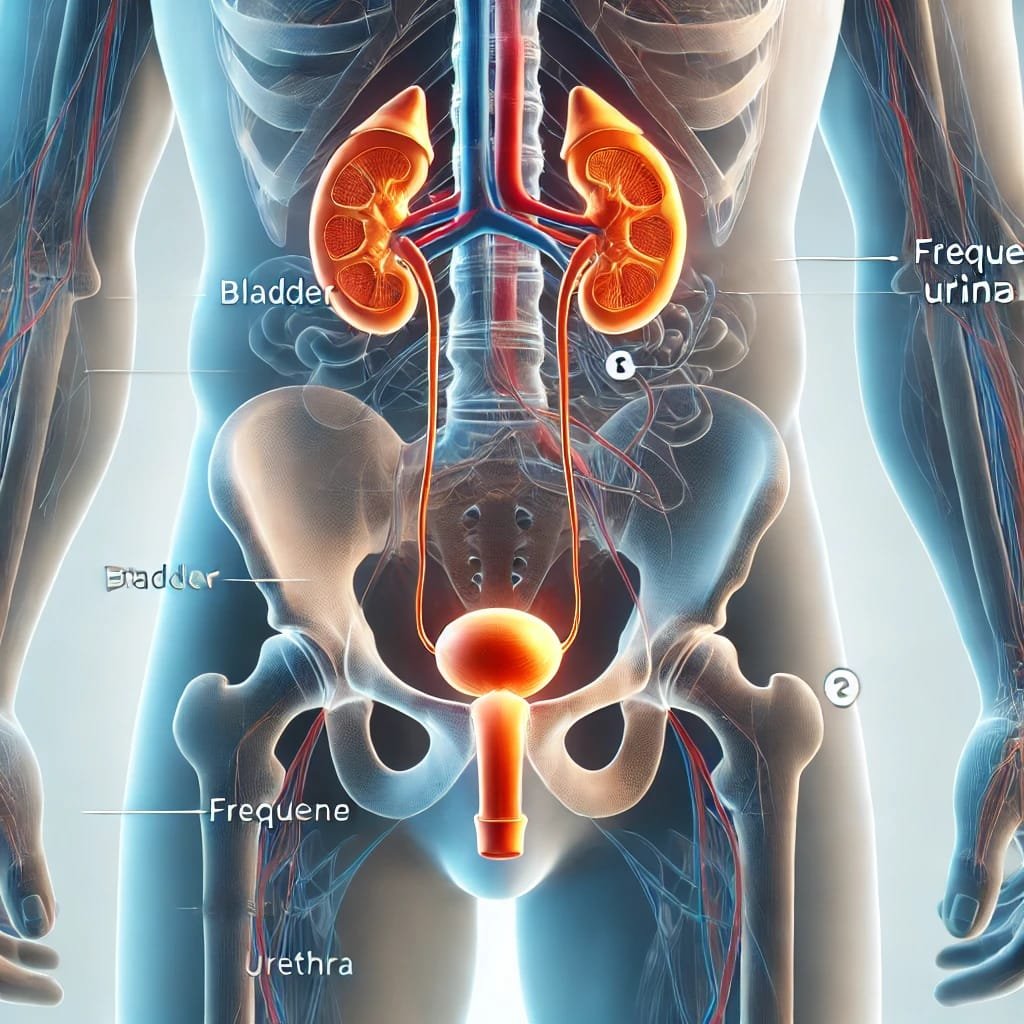how to stop frequent urination:-Frequent urination, or the urge to urinate more often than usual, can be an inconvenient and sometimes embarrassing condition. While it may seem like a minor issue, frequent urination can significantly impact a person’s daily life and may be a sign of an underlying health problem. This article explores the types, causes, disadvantages, and remedies for frequent urination, providing comprehensive insights into managing this condition effectively.

Types of Frequent Urination
Frequent urination can be categorized into several types based on its nature and underlying causes:
1. Polyuria: This refers to the production of abnormally large volumes of dilute urine. It often results from excessive fluid intake, diabetes, or certain medications.
2. Nocturia: Nocturia is the frequent need to urinate during the night. It can be caused by excessive fluid intake before bed, aging, or health conditions such as heart failure or diabetes.
3. Urge Incontinence: This type of frequent urination occurs when a person experiences a sudden and intense urge to urinate, leading to involuntary leakage. It is often associated with overactive bladder syndrome.
4. Stress Incontinence: This occurs when physical movements or activities like coughing, sneezing, or exercising cause urinary leakage. While it is not frequent urination per se, it can lead to more frequent bathroom visits.
5. Overflow Incontinence: In this condition, the bladder doesn’t empty properly, leading to frequent urination in small amounts. It may result from a blockage in the urinary tract or neurological disorders.
Causes of Frequent Urination
Understanding the underlying causes of frequent urination is crucial for effective treatment. Some common causes include:
1. Urinary Tract Infections (UTIs): UTIs are one of the most common causes of frequent urination. Bacterial infections in the urinary tract can cause inflammation and irritation, leading to an increased need to urinate.
2. Diabetes: High blood sugar levels in both type 1 and type 2 diabetes can lead to increased urination as the body tries to eliminate excess glucose through the urine.
3. Pregnancy: During pregnancy, the growing uterus can put pressure on the bladder, leading to frequent urination. Hormonal changes also play a role.
4. Prostate Problems: In men, an enlarged prostate can obstruct the flow of urine, causing frequent urination, especially at night.
5. Overactive Bladder Syndrome: This condition involves frequent, sudden urges to urinate that are difficult to control, often leading to incontinence.
6. Diuretic Medications: Medications designed to remove excess fluid from the body, commonly used to treat high blood pressure, can lead to frequent urination.
7. Interstitial Cystitis: Also known as painful bladder syndrome, this chronic condition causes bladder pressure, pain, and frequent urination.
8. Neurological Disorders: Conditions like multiple sclerosis, stroke, or spinal cord injuries can interfere with the nerves that control bladder function, leading to frequent urination.
Disadvantages of Frequent Urination
Frequent urination can have several negative impacts on an individual’s life, including:
1. Disruption of Sleep: Nocturia can lead to frequent interruptions in sleep, causing fatigue and affecting overall health and well-being.
2. Dehydration: Excessive urination can lead to dehydration, especially if fluid intake does not match the output. This can cause symptoms like dry mouth, dizziness, and weakness.
3. Embarrassment and Anxiety: The constant need to find a bathroom can lead to social embarrassment and anxiety, particularly in public or during long trips.
4. Impact on Productivity: Frequent bathroom breaks can interfere with work or other activities, reducing productivity and concentration.
5. Underlying Health Issues: Frequent urination can be a sign of serious health conditions like diabetes or kidney problems, which require medical attention.
how to stop frequent urination
Managing frequent urination often involves addressing the underlying cause. Here are some common remedies:
1. Lifestyle Modifications:
– Fluid Management: Reducing fluid intake, especially before bedtime, can help manage nocturia. However, it’s important not to cut back too much to avoid dehydration.
– Dietary Changes: Avoiding bladder irritants like caffeine, alcohol, and spicy foods can reduce the urge to urinate.
– Pelvic Floor Exercises: Kegel exercises can strengthen the muscles that control urination, particularly helpful for those with stress incontinence.
2. Medical Treatment:
– Medications: Depending on the cause, medications may be prescribed to manage conditions like diabetes, UTIs, or an overactive bladder.
– Bladder Training: This involves gradually increasing the time between urination to train the bladder to hold more urine.
– Surgical Options: In cases of severe prostate enlargement or other structural issues, surgery may be necessary to alleviate symptoms.
3. Herbal Remedies:
– Saw Palmetto: Often used to treat prostate problems, saw palmetto may help reduce urinary frequency in men with benign prostatic hyperplasia (BPH).
– Pumpkin Seed Extract: This is believed to support bladder health and reduce symptoms of overactive bladder.
– Corn Silk: Used in traditional medicine, corn silk may help soothe the urinary tract and reduce inflammation.
4. Behavioral Therapies:
– Mindfulness and Relaxation: Techniques such as deep breathing and mindfulness can help reduce the anxiety associated with frequent urination, which in turn can reduce the urge to go.
5. Medical Consultation:
– Regular Check-ups: It is important to consult a healthcare provider to rule out or treat any underlying conditions. Early diagnosis can prevent complications and improve the quality of life.
READ MORE-How to manage paralysis

Conclusion
how to stop frequent urination:-Frequent urination is a condition that can significantly impact daily life. Understanding the types, causes, and potential disadvantages of frequent urination is the first step in managing the condition effectively. By making lifestyle changes, exploring herbal remedies, and seeking medical advice when necessary, individuals can find relief and improve their overall well-being.
